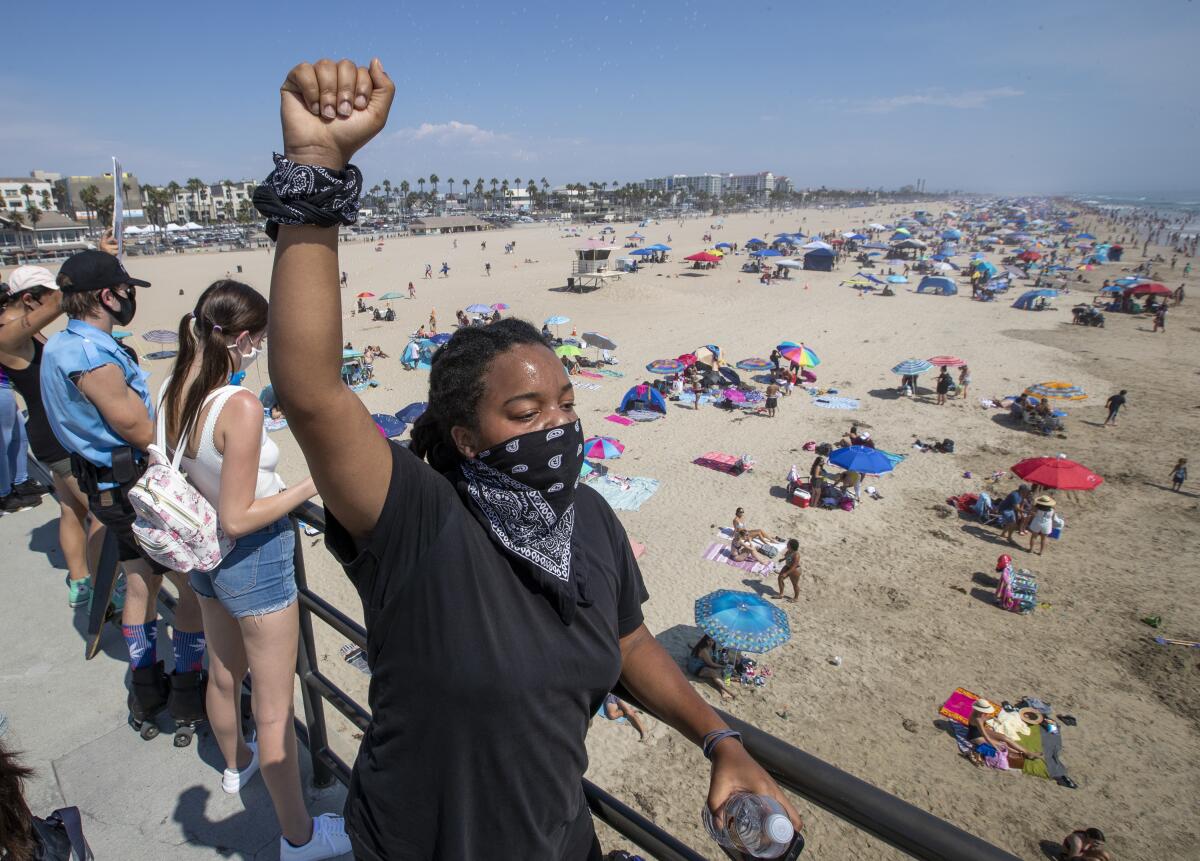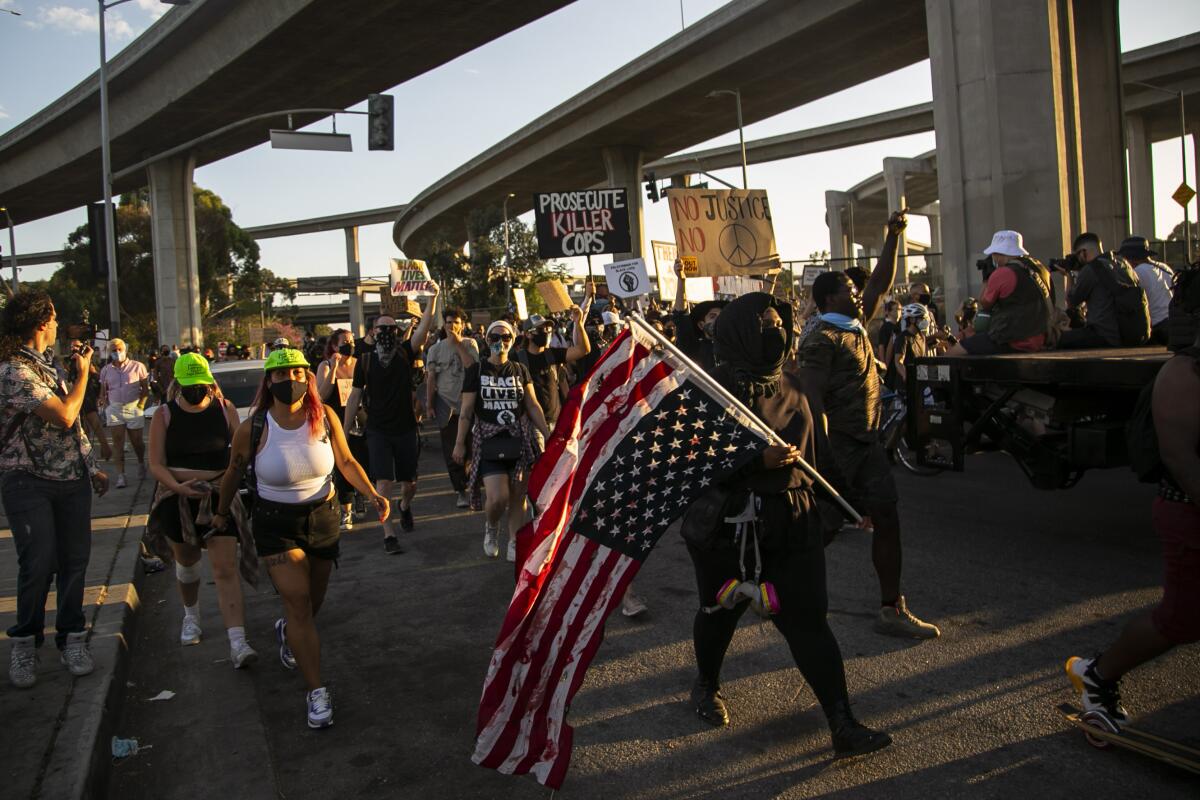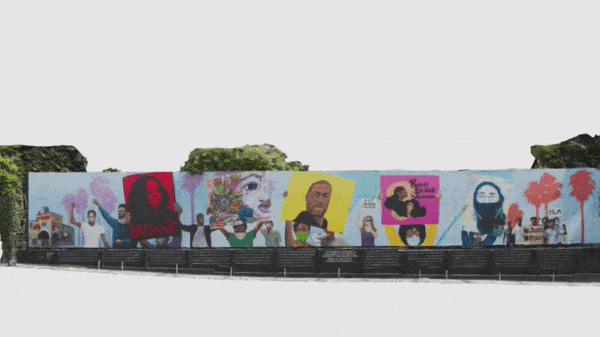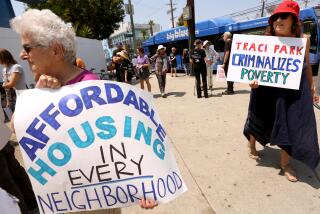‘No going back’ to racist past, L.A. civic leaders say of post-COVID future

- Share via
Early in the spring, before the coronavirus shutdowns, Los Angeles County Health Director Barbara Ferrer met with an influential group of philanthropic and civic leaders to foretell the coming crisis.
Members of the group, called the Civic Alliance, saw dire implications for the “low income and marginalized communities of color” that are the focus of their work, said Fred Ali, president and chief executive of the Weingart Foundation.
For the record:
5:42 p.m. Sept. 10, 2020An earlier version of this article said that 18% of Los Angeles County residents are either undocumented or living with a family member who is, disqualifying them for federal coronavirus relief funds. While that is true for the vast majority, there are some who still qualify for the funds.
“Our suspicion was that the impact we were going to see from this crisis was going to be disproportionate on those communities we most care about,” Ali said.
There is no return to a system that over‐policed, over‐incarcerated, and under‐delivered.
— “No Going Back,” a report on racial inequity in Los Angeles
That warning precipitated months of Friday Zoom sessions involving representatives from major nonprofits, public officials and academics from UCLA and USC. Launched with a focus on COVID recovery, their examination grew to embrace everything that ails Los Angeles seen through the lens of racism.
“Going back to the Los Angeles of the past is not progress,” they declare in a report released Wednesday. “We propose dismantling those structures and prioritizing how resources will be directed in order to achieve a more accountable Los Angeles driven by outcomes centered on racial equity.”

The report, a novel-length and heavily footnoted volume called “No Going Back,” is part academic treatise and part manifesto, painting a dark picture of racial and economic inequity and recommending a sweeping overhaul of the systems that it holds responsible.
In 15 chapters, supported by dozens of charts and scores of bullet points, “No Going Back” documents inequities in almost every aspect of public life and offers prescriptions that might have seemed unthinkable only months earlier, before a deadly pandemic and public outrage over the killings of Black people by police forced a rethinking of what was imaginable.
The recommendations range from the generic: “Apply a racial equity lens to all budget decisions,” to the specific and radical: “Lower the voting age to 16” in local elections.
The report proposes increases in public spending on rental assistance, housing construction, mental health and youth services through such measures as statewide single-payer healthcare funding, with subsidies for immigrants who lack legal residency and cash assistance to low-income workers and those who have lost work.
It proposes the formation of a public utility to provide internet access to all and a new centralized regional agency to manage the housing delivery system and hold government agencies responsible for meeting homeless housing targets.
To pay for all that, it proposes reform of the property tax system established by Proposition 13, new real estate transfer taxes and emergency bonding authority. It also advocates for huge increases in federal supports such as Section 8 rental vouchers.
Conceived as a project to prepare for the impact of the coronavirus on low-income communities of color and plan for their recovery, Committee for Greater LA, as the group called itself, broadened its view as news reports of George Floyd, Breonna Taylor and other Black people being killed by police spawned a nationwide protest movement.
The Black Lives Matter movement has inspired murals honoring Black lives and people killed by police brutality. But time poses a threat to the art.
“Public consciousness has shifted,” the report proclaimed. “We should hold no affection for a system that has long stripped assets from communities through discrimination and redlining rather than built them up through public and private investment.”
While the report embraces a panorama of solutions that would each be a huge undertaking, it does not identify specific actions to achieve them.
“A huge piece of this is about a civic conversation,” said committee member Sarah Dusseault, a Los Angeles Homeless Services Authority commissioner. “What does a bold future look like?
“A lot of the mid- to longer-term action items really require more of a civic conversation that we’re trying to spark, with racial equity at its core, with accountability at its core,” Dusseault said.
The report echoes earlier examinations of the racial and ethnic stresses in Los Angeles society that have erupted into past violence.

Nearly 30 years after the Christopher Commission faulted the Los Angeles Police Department in its probe of the 1992 riots following not-guilty verdicts in the beating of Rodney King, the new report found broad evidence of continued racial bias in policing.
“There is no return to a system that over‐policed, over‐incarcerated, and under‐delivered,” it said.
And, more than 50 years after the Kerner Commission concluded that white racism — not black anger — was the underlying cause of the 1965 Watts riots, it concluded that Black and other minority communities continue to be victimized by systemic racism evidenced by disparities in health, income and education and rates of homelessness and incarceration.
“Police brutality is just the tip of a racist iceberg that extends to systems of education, the economy, and healthcare,” it said.
But following both events, “reports were written and plans were launched to deal with the under‐investment that gave rise to unrest — but little fundamentally changed, particularly for Black Angelenos,” the authors said. “So what might be different this time?”
They cited three factors that could make a difference this time — “the profundity of the moment” as Black Lives Matter protests continue, a growing recognition that “the current levels of inequality and racial disparity threaten public health in the short run and prosperity in the long run” and the growing strength of community organizations to “propel a seismic change for the better,” among them the 10 organizations that funded the study, including the California Community Foundation and California Wellness Foundation.
For all its breadth, “No Going Back” makes no attempt to prioritize its recommendations either by urgency, importance or difficulty.
“This was not intended as a specific to-do list for every level of government,” said committee Chairman Miguel Santana, a former high-level administrator in both the county and city. “We hope that any candidate for office, whether for mayor or City Council or Congress or the state legislature, would embrace the thesis that the current systems are simply not working.”
Santana pointed to the patchwork of costly workarounds — such as the state picking up the bill for emergency room visits — required by the exclusion of undocumented immigrants from social services systems.
The report found that 18% of Los Angeles County residents, including 200,000 children, are either undocumented or living with a family member who is, disqualifying most of them for federal coronavirus relief funds.
“We rely on their workforce for the food we eat, for keeping facilities clean, and for taking care of our children,” Santana said. “We believe we should fully include this sector of our society into full membership of what it means to be a Californian.”
The report’s conclusions rest on research by Manuel Pastor, director of the USC Equity Research Institute, and Gary Segura, dean of UCLA’s Luskin School of Public Affairs, who were its primary authors.
The two researchers and their teams traced current inequities to the lack of effective reforms after the Watts riots, “white flight” that led to further segregation of South L.A., the disproportionate effect of the county’s de-industrialization on Black Angelenos, followed by the impacts of the Great Recession.
From 1970 to 2010, income of Black families remained close to two-thirds that of white families, but dropped to just 54% in 2018, they said.
Overlaying those disparities on the COVID-19 pandemic, they found that Black and Latino workers were far more likely than white workers to work in high-risk jobs classified as essential and far less likely to have a computer and high-speed internet at home to participate in schoolwork while in-school teaching is prohibited.
Though they have not laid out a road map for implementing their proposals, members of the committee have vowed to continue pushing their agenda, said Ali of the Weingart Foundation.
The next steps will be to set priorities, build an organization and sort out how to pursue advocacy that is inherently political , Ali said.
“To get some of this done it does take politics,” Ali said. “For some of us running foundations there are some things we can do and some things we cannot do. But we can empower others to act.”
More to Read
Sign up for Essential California
The most important California stories and recommendations in your inbox every morning.
You may occasionally receive promotional content from the Los Angeles Times.












